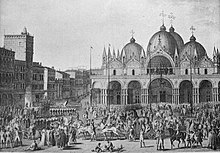
Back النهب النابليوني للفن Arabic Expolio napoleónico Spanish Spoliations napoléoniennes French Spoliazioni napoleoniche Italian
| Napoleonic looting of art | |||||
|---|---|---|---|---|---|
| Part of the French Revolutionary Wars and the Napoleonic Wars | |||||
 Horses of Saint Mark en route to France from Venice, Jean Duplessis-Bertaux, 1797 | |||||
| |||||
The Napoleonic looting of art (French: Spoliations napoléoniennes) was a series of confiscations of artworks and precious objects carried out by the French Army or French officials in the conquered territories of the French Republic and Empire, including the Italian Peninsula, Spain, Portugal, the Low Countries, and Central Europe. The looting began around 1794 and continued through Napoleon I's rule of France, until the Congress of Vienna in 1815 ordered the restitution of the works.[1]: 113
During the Napoleonic era, an unknown but immense quantity of art was acquired, destroyed, or lost through treaties, public auctions, and unsanctioned seizures. Coins and objects made of precious metals, such as the Jewel of Vicenza and the bucentaur, the Venetian state barge, were melted down for easier sale and transport, to finance French military wages. In the confusion, many artworks and manuscripts were lost in transit or broken into pieces, which were often never reunited, as occurred with the marble columns of the Aachen Cathedral.
French officials justified taking art and other objects of value as both a right of conquest and as an advancement of public education, encyclopedism, and Enlightenment ideals. These seizures redefined the right of conquest in Europe and caused a surge of interest in art and art conservation.

At the Congress of Vienna, Austria, Spain, the German states, and the United Kingdom ordered the restitution of all the removed artworks. Many were returned, but others remained in France, due to resistance from the French administration, the high costs of transportation, or the risk of damage to fragile works. As not all of the artwork was returned, this campaign of French looting continues to affect European politics, museology, and national cultural identity today.
© MMXXIII Rich X Search. We shall prevail. All rights reserved. Rich X Search